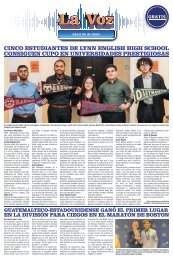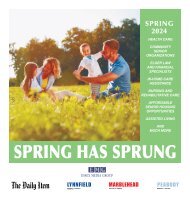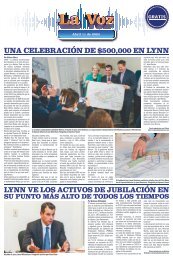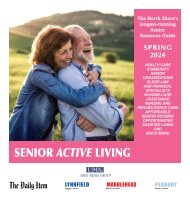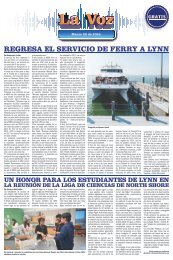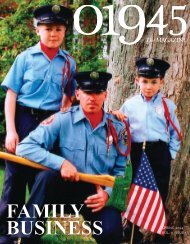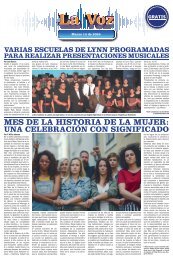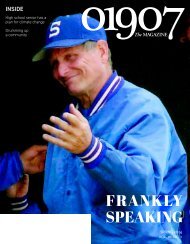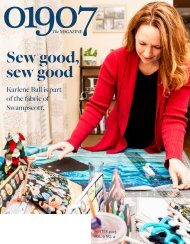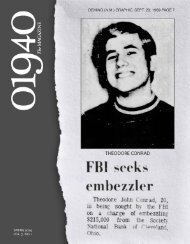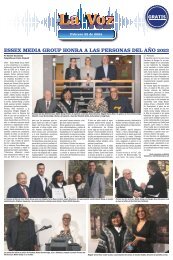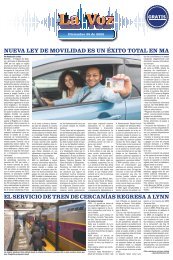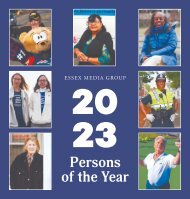01907 Winter 2020 V3
Create successful ePaper yourself
Turn your PDF publications into a flip-book with our unique Google optimized e-Paper software.
26 | 01907
She
Natasha Soolkin, of Swampscott, is the executive
director of the New American Center, which provides
services to refugees and immigrants in Lynn.
PHOTO: SPENSER HASAK
opens
Hope's
door
BY GAYLA CAWLEY
Swampscott resident Natasha Soolkin
knows how difficult it can be for the
immigrants and refugees she works
with to adjust to their new home in the
United States.
Soolkin, regional director of the New
American Center in Lynn, immigrated
to the United States from the former
Soviet Union 30 years ago.
"I know I can relate very closely to
what people are experiencing," said
Soolkin. "I was young so I can only
imagine what happens when people
come who are older or come with kids
they need to take care of and they
don't have any means to do that, or
connections or support system. It takes a
while before you start feeling OK, feeling
like you are part of the community."
A young adult at the time of her
immigration, Soolkin said that while
her path may have been easier than the
refugees she works with — who may be
leaving their countries to escape war,
persecution or natural disasters — there
is no such thing as an easy immigration.
For example, she said children have
to learn a new language so they can
understand and communicate with their
classmates and teachers at school. Adults
with children have to find a way to earn
money in order to support their families.
And seniors, who are already an isolated
population, need to adjust to seeing the
world outside of the walls they were used
to in their former countries, Soolkin said.
"You hear people tell you that they had
a very easy path," said Soolkin. "There's
no easy immigration because everyone is
experiencing hardships along the way."
Established in 2002, the New
American Center, formerly known as
the Russian Community Association
of Massachusetts, is a multi-ethnic,
multi-service site providing culturally
appropriate and linguistically accessible
social service assistance to refugees and
immigrants in the Lynn area.
The New American Center was created
by the grassroots organization, Mutual
Assistance Association Coalition, in order
to meet the large numbers of increasingly
diverse newcomers coming to Lynn.
Soolkin said the center provides case
management, programming and classes,
which helps immigrants and refugees
learn English, gain employment, adjust
to their new environment, and work
toward becoming American citizens.
"The important part of our work is
our citizenship service," said Soolkin,
explaining that the center is certified by
the U.S. Department of Justice to do the
immigration work, which involves helping
people put together their citizenship
applications and providing them with
English as a Second Language classes.
"We have different levels where
people learn about history and civics
to prepare for the interviews," said
Soolkin. "Last year, we helped about
200-plus people to (become) ready for
the interviews. We have people becoming
citizens even in these COVID times."
The New American Center provides
services to 500 or 600 people a year, but
Soolkin said the majority of refugees are
coming to Lynn from six countries —
Congo, Cameron, Afghanistan, Eritrea,
Haiti and Cuba.
The organization also serves many
immigrants, said Soolkin, noting that
some of that effort involves working with
the Lynn Public Schools.
Often, those clients are coming from
unrest and strife in their former countries
or have come from situations where they
have been outsiders for many years, if not
their whole lives, Soolkin said.
"That's where we're trying to get in
and show people that it's not survival,"
said Soolkin. "It's life and they can enjoy
it and turn their heads from what was the
most difficult part of their lives."
Like many other organizations, the
New American Center has had to adjust
to providing services differently during
the COVID-19 pandemic. Soolkin said
the center was able to quickly switch to
offering its programming and classes
online, and has started to offer a food
distribution service and financial support
for clients.



